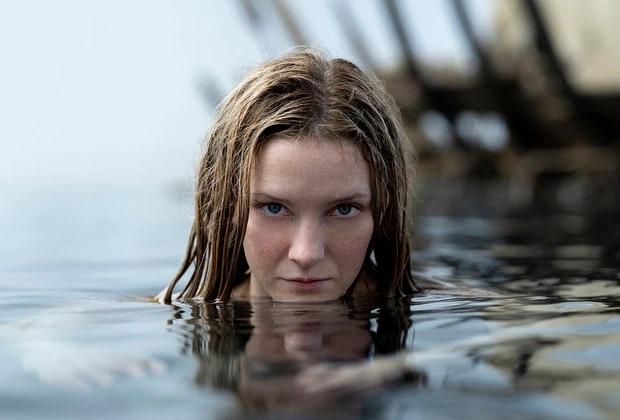I don’t envy that person who has to follow Peter Jackson’s note perfect original trilogy. I mean, if the general reception of “the Hobbit” films is any indication, not even HE can follow himself. “The Lord of the Rings: The Rings of Power” rather cleanly builds a series of classic stories and archetypal character arcs in its first two episodes. However, the shadows of what came before, not unlike the ever encroaching darkness of the ubiquitous Sauron, loom eerily in our expectations of what we think we should see. There are those fans of anything Tolkien or Jackson that will likely plant their Hobbit feet firmly under this ominous cloud, content to complain as they refuse to step into the light. It’s best to embark upon this Amazonian journey with a clean slate. The sooner you can appreciate the show for what it is instead of hating it for what it isn’t, the sooner you’ll be able to embrace that particularly child-like call to exploration.
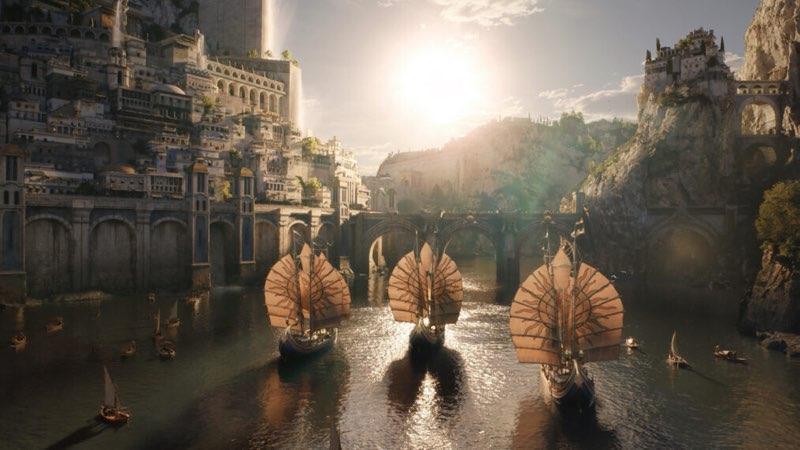
Now, we can’t force ourselves to like a particular style. Human beings, elves, and dwarves alike are all possessed by that little thing we call taste. So if you prefer grey material where twins rub up against the tomb of their own incest baby, then perhaps you might want to ferry over towards HBO Max for an invitation a certain game. I personally believe that there is a stage for all fifty shades of the morality spectrum. It’s all in how you feature them.
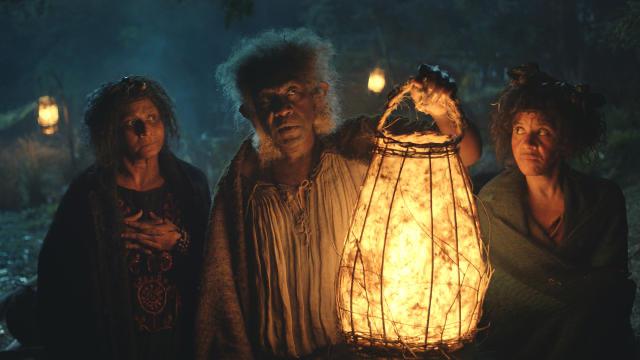
“Rings of Power” is quite an earnest tale. The heroes are heroes, and the drama plays out on an accessible stage. Characters may quarrel over varying approaches to solving certain problems, like when Morfydd Clark’s Galadriel suggests that they should continue to hunt Sauron while Robert Aramayo’s Elrond asserts that the evil has been vanquished. The relationship between these two key players comes across only is connecting lines and the way the actors play them. The dialogue does not linger in much subtlety and spends little to no time exploring the every day of what brings people together as we would traditionally associate. For instance, there’s no scene where Galadriel and Elrond talk through her confusing feelings towards the hot sea-fairer (a mysterious and rugged Charlie Vickers) she just marooned with over a plate of Elvin bread. We see evidence of each race’s culture, like when the Hobbit-like people converse about their burrow borders over a bowl of snails, but these clues in world-building are given to us visually.
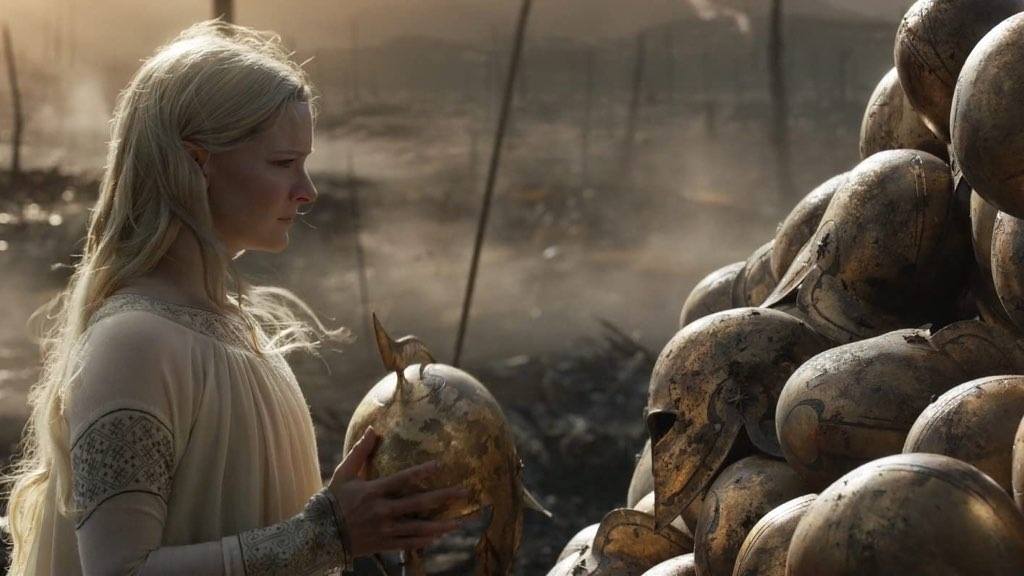
Most of what each character is concerned with are external problems a hero’s journey narrative can safely examine for the entire family. It’s not complicated or particularly intriguing, but there was something satiating about how *Elvish curse word* earnest it insisted upon being. This medieval tale is full of musings on the moon and the stars and the fireflies… and you know what? I was here for it. This show plays out like a bedtime story. Sometimes I don’t wish to attend a Red Wedding right before bed. After the lackluster beginning, which was set in the Undying Lands (a place I never thought we should see, and certainly not how they depicted it), I was wrapped in the warm blanket of a simpler time.
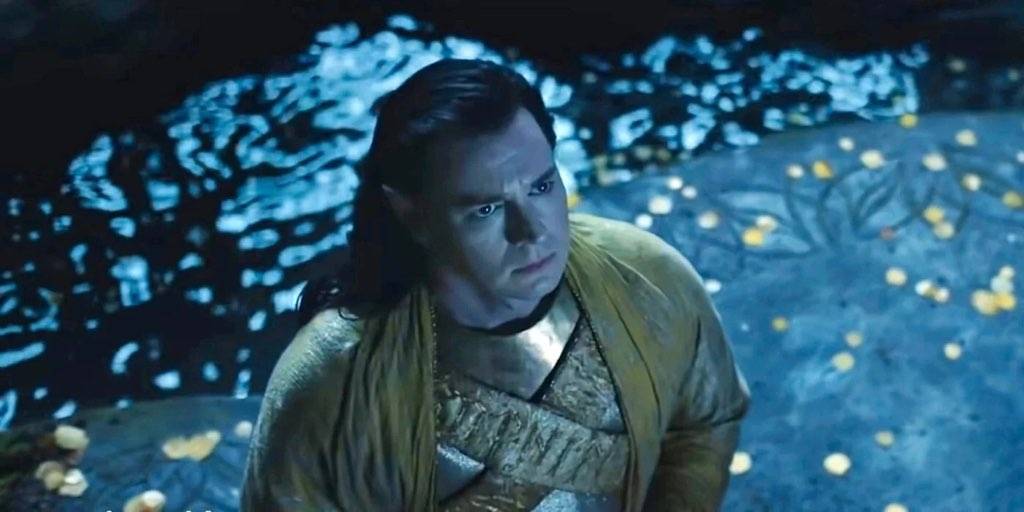
There are flushes of Tolkien themes like the origins of true light and how balance can be found within nature. I really appreciated how lighting and color choice contributed to bringing these themes to life in every impeccably dressed (or computer generated… I couldn’t really tell…) set. When Galadriel and Elrond mess about in the Elvin woods, the tapestries depicting stories of old charmed me with their implied history, and the trail of flowers which intertwines with the surrounding statues added flavor. Right down to the pedals strewn about Galadriel’s trailing cloak, I was surprised by how detailed the designs were. There was an attention to the small things that felt very reminiscent of Jackson’s original trilogy. It wasn’t revolutionary, but I did appreciate the overall effect, because that essential LOTR’s, Enya-adjacent moodiness only comes about when things feel magical. It’s a tricky thing to discern what makes something magical or, um, Muggle? It’s like a true romantic connection. You can’t force it. I can say I “felt” these first two episodes. I may not be super invested in the plot. I may have little ground to stand on, seeing as I prefer the theatrical versions of the originals and I’ve only read “The Hobbit.” But you know what, I’ll tune in for episode three if only to see what amazing, surprisingly real looking creatures (the likes of which there were several) will show up to terrorize the people with swords. I’ll continue my subscription so that I can hear more poetry about the way the wind blows and how that influences destiny. It’s the simple things that make this show taste sweet like those berries in the Harfoot brush. I can’t wait to see what mischief all these fantasy folk will stir up. For my silver coins, these people won their roll for initiative, and believe me, my cynical tush did not anticipate that being the case.
